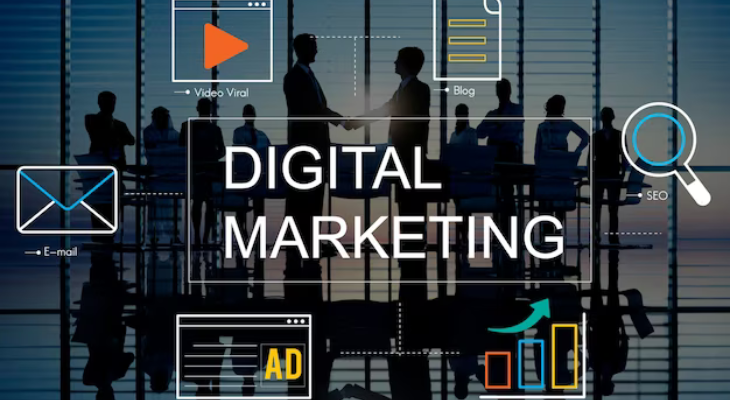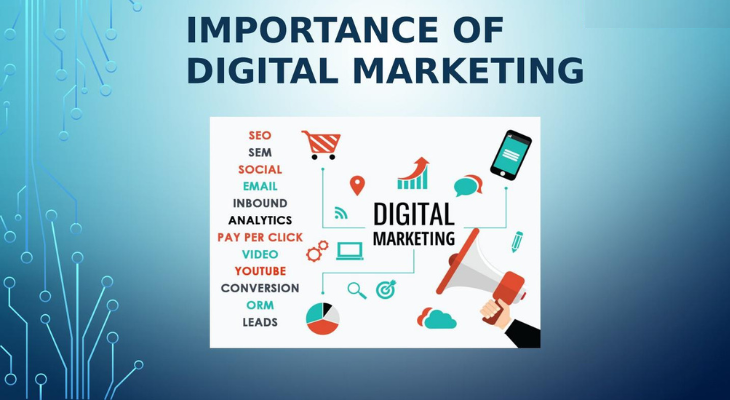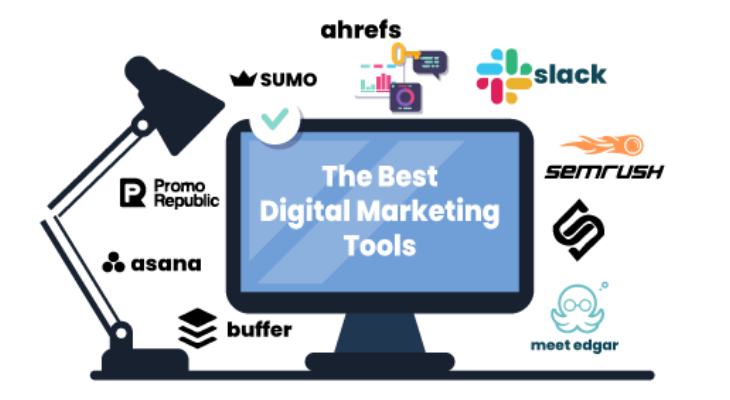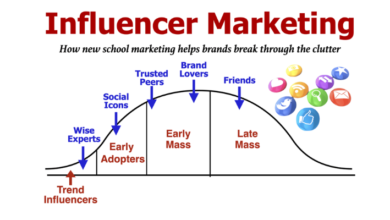Unlocking the Power of Digital Marketing: Types and importance

Digital Marketing need to adjust to new tactics in an increasingly digital world if they want to effectively reach their target audience in digital marketing . In the current digital era, digital marketing is essential for success. This essay will examine the field of digital marketing, including its significance, varieties, and practical applications. We’ll also address a few frequently asked concerns to make sure you fully comprehend.
Table of Contents
ToggleWhat is Digital Marketing?

To put it simply, digital marketing is the process of promoting and advertising goods and services to prospective consumers using digital platforms. It’s an all-encompassing term that covers a broad spectrum of online techniques and approaches used to increase brand recognition, interact with consumers, and eventually boost sales.
Types of Digital Marketing
Optimizing your website to appear higher in search engine results is the main goal of search engine optimization, or SEO. This improves your website’s organic (free) traffic. Important elements include thorough keyword research (using tools like Ahrefs or Moz), off-page SEO, and on-page SEO.
In order to draw in and keep the interest of your target audience, content marketing entails producing and disseminating informative content, such as blog entries, articles, and videos. In your field, credible content marketing increases authority and trust.
Social media marketing helps you engage with your audience by utilizing sites like Instagram, Twitter, and Facebook. The secret to success is using social media engagement and advertising methods.
A direct line of communication with your audience is email marketing. It entails promoting your goods or services to your subscribers through targeted email marketing. Here, individuality is crucial.
Websites like Google Ads and Bing Ads are examples of pay-per-click (PPC) advertising networks. These let you make sponsored advertisements that show up when people search for particular keywords. Writing effective advertising text is essential.
Examples of Digital Marketing
There are plenty of successful case studies in the field of digital marketing. Companies like Coca-Cola, Nike, and Airbnb have run outstanding advertising campaigns. For example, Airbnb used social media and user-generated content to create a global community. Nike’s digital ads, such as “Just Do It,” have endured, and Coca-Cola’s customized share-a-coke campaign struck a chord with viewers all across the world.
The Importance of Digital Marketing

Now let’s explore the importance of digital marketing. Digital marketing is revolutionary for businesses in the fast-paced world of today, and here’s why:
Global Reach: With digital marketing, you may connect with people all over the world. Through effective techniques, your company may reach out to potential clients all around the world.
Cost-Effective: Compared to conventional marketing strategies like print or television advertisements, it is frequently less expensive. With more effective budget allocation, you can increase return on investment (ROI).
Targeted Advertising: You may target your ideal audience based on their demographics, interests, and online behavior by using techniques like SEO and pay-per-click advertising.
Measurable Outcomes: You may monitor the effectiveness of your campaigns by using real-time data and analytics provided by digital marketing. You are able to observe what is and is not working and adapt as necessary.
Digital Marketing Tools and Technologies

To remain competitive in the ever-evolving realm of digital marketing, smart plans must be combined with skillful application of state-of-the-art tools and technologies. Let’s examine some of the key instruments and technological advancements that enable digital marketers to optimize their work and attain superior outcomes.
Marketing Automation
Streamlining and Enhancing Marketing Campaigns
Tools for marketing automation are crucial for streamlining, maximizing, and expanding your marketing initiatives. They assist you in handling a variety of duties, such as email marketing and lead nurturing. Among the essential elements of marketing automation are:
CRM Software: You may manage and keep track of customer interactions and data by using Customer Relationship Management (CRM) software. HubSpot, Zoho CRM, and Salesforce are popular choices.
Email marketing tools: HubSpot’s email marketing module, Constant Contact, and Mailchimp all make it easier to create, automate, and monitor email campaigns.
Analytics and Reporting: Comprehensive information on the functionality, traffic sources, and user behavior of your website may be obtained with tools such as Adobe Analytics and Google Analytics.
Advantages of Digital Marketing
- Global Reach: Using digital marketing, you may connect with people all over the world. Geographical obstacles can be overcome by connecting with potential clients globally, regardless of the nature of your business.
- Cost-Effective: Compared to conventional marketing strategies like print ads, TV commercials, or billboards, it’s frequently less expensive. You can increase return on investment (ROI) and allocate your budget more effectively.
- Targeted Advertising: Advanced targeting options are provided by digital marketing. You may precisely target your ideal audience by using methods like SEO and pay-per-click advertising, which are based on their online behavior, interests, and demographics.
- Measurable Outcomes: Digital marketing offers real-time data and analytics, in contrast to traditional marketing. Your campaigns’ performance may be tracked, allowing you to understand what’s working and what isn’t and to make quick changes.
- Personalization: You may provide your audience with tailored offers and information by using digital marketing. You may increase engagement and conversions by customizing your messaging to certain segments by evaluating user behavior and preferences.
- Brand Engagement: You may meaningfully interact with your audience through social media and content marketing. You have the ability to reply to inquiries, create a community around your business, and address comments.
- Flexibility and Adaptability: There is flexibility in digital marketing. You can modify your plan in reaction to shifting consumer preferences, industry developments, and market conditions. This flexibility is essential in the ever-changing digital environment.
- Improved Customer Experience: Better customer involvement is made possible by digital marketing. You may increase customer happiness by responding to questions quickly, providing insightful material, and designing frictionless online experiences.
Disadvantages of Digital Marketing
- High Level of Competition: There is fierce competition in the digital sphere. It’s hard to stand out when there aren’t many hurdles to entry and a lot of companies competing for the same audience’s attention.
- Information Overload: There is an abundance of information and advertisements on the internet. Digital marketing campaigns may therefore be less successful since customers may become overloaded, choose to ignore advertisements, or use ad-blockers.
- Privacy Concerns: In recent years, data privacy concerns have drawn more attention. Stricter laws like the CCPA and GDPR have increased the complexity of data collection and targeting. Companies must carefully handle these regulations.
- Ad Fatigue: Users who are often exposed to digital ads may develop a tolerance to marketing messaging. Reduced engagement and click-through rates may follow from this.
- Technical Difficulties: Overseeing digital marketing initiatives can present technical difficulties. There may be a learning curve involved in comprehending and utilizing solutions such as email marketing platforms or Google Ads.
- Quick Technological Changes: Since technology is the foundation of digital marketing, it changes quickly. It can be difficult to stay current with the newest tools and trends, particularly for small enterprises with little funding.
- Possibility of Negative Comments: Online reviews and social media give users a forum to express their thoughts. If handled poorly, negative feedback and reviews can harm a brand’s reputation.
- Ad Blocking: To get rid of intrusive advertising, many people utilize ad-blockers. Digital advertisements become less visible and effective as a result.
- Difficulty Measuring ROI: Although digital marketing provides a wealth of statistics, pinpointing the precise ROI can be difficult. Sometimes it’s unclear which precise marketing initiatives resulted in conversions.
Steps of Digital Marketing
- Clearly define your objectives:Establish definite, precise goals at the outset of your digital marketing endeavors. What goals do you have in mind? Having specific goals can help you define your approach, whether it is to increase online sales, develop your email subscriber list, or drive more visitors to your website.
- Recognize Your Goal Audience:It’s critical to comprehend who your target audience is. Who are the perfect clients for you? What are their online habits, hobbies, and demographics? You may better adapt your marketing efforts to your target audience’s preferences by developing thorough buyer personas.
- Create a thorough plan for digital marketing:To effectively reach your target, a digital marketing strategy should incorporate a variety of strategies and channels. Content marketing, SEO, social media, email marketing, and paid advertising (PPC) are all important components of your approach.
- Make Your Website Better:Frequently, your website serves as your audience’s initial point of contact. Make sure it’s search engine optimized, responsive to mobile devices, and easy to use. Enhancing a website’s design, navigation, and speed can significantly improve user experience.
- Produce Superior Content:The king of internet marketing is content, Create material that is interesting, educational, and beneficial to your audience. This covers articles, videos, infographics, blog entries, and more.
- Put SEO (search engine optimization) into practice:Make sure your content is search engine optimized by employing appropriate on-page and off-page SEO strategies. To find pertinent terms and phrases to include in your content, including LSI keywords, do keyword research.
- Make Use of Social Media Promotion:Use social media channels that correspond with the interests of your audience. Create a consistent social media presence, distribute your material, interact with followers, and carry out focused advertising initiatives.
- Email Promotion:Create and organize your email list. Develop individualized email marketing campaigns to interact with subscribers and nurture leads. Keep an eye on the effectiveness of your email marketing campaigns and adjust as necessary.
- Pay-Per-Click (PPC) Advertising:Create pay-per-click (PPC) campaigns using Google Ads or Bing Ads. Create engaging ad language, pick pertinent keywords, and target your audience with interests and online activity in mind.
- Track and evaluate outcomes:To monitor your progress, use analytics tools for digital marketing. Examine data like email open rates, social media engagement, website traffic, and conversion rates. Evaluate your campaigns’ efficacy on a regular basis and modify your plan of action accordingly.
- Adjust to New Developments:Keep abreast on the most recent developments in digital marketing trends and technologies. Examine digital advertising advances such as blockchain, artificial intelligence, voice search optimization, and video marketing. Modify your plan of action to take advantage of fresh chances as they come.
Conclusion
To sum up, digital marketing is an effective instrument for contemporary companies. It provides a worldwide reach, affordability, and accurate targeting. Through an exploration of the different types, practical examples, and answers to frequently asked questions, you now possess the information necessary to fully realize the potential of digital marketing for your company. Start now, and you’ll see your brand flourish in the digital world!
FAQs about Digital Marketing
What’s the cost of digital marketing?
The cost of digital marketing varies widely depending on your business goals and strategies. Small businesses can start with a modest budget, while larger enterprises may invest more. It’s important to understand that digital marketing offers flexibility, allowing you to allocate your budget based on your specific needs and goals.
What social media platforms are best for my business?
The choice of social media platforms depends on your target audience and business type. Facebook and Instagram are versatile options suitable for many businesses. Twitter is great for real-time updates and customer engagement. LinkedIn is ideal for B2B businesses. To make an informed decision, research your audience’s preferences and behaviors on various platforms.
How do I measure the effectiveness of my digital marketing efforts?
Common KPIs include website traffic, conversion rates, click-through rates, social media engagement, and email open rates. To gain insights into your performance, use analytics tools like Google Analytics, social media insights, and email marketing platforms.
What’s the role of email marketing in digital marketing?
Email marketing plays a significant role in nurturing relationships with your audience. It’s a direct communication channel to engage subscribers, deliver personalized content, promote products or services, and build trust. Effective email campaigns are tailored to your audience’s interests, making it an essential component of digital marketing.
How can I adapt to emerging trends in digital marketing?
Staying up-to-date with emerging trends in digital marketing is essential. Keep an eye on innovations like voice search optimization, video marketing, artificial intelligence, and blockchain in digital advertising. Invest in ongoing learning, attend industry conferences, and follow reputable digital marketing blogs to stay informed about the latest developments.
How long does it take to see results with SEO?
SEO is a long-term strategy. You’ll typically see noticeable results in 4-6 months, but it takes time to establish authority.





2 Comments